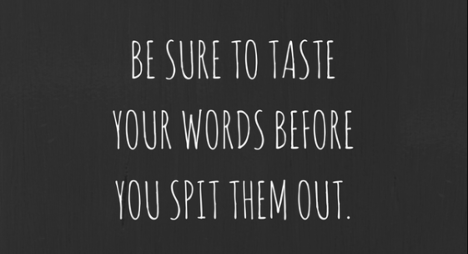Let's LEAD - July 2021
Really?
Maybe I just didn't notice it before, but it seems like folks are getting WAY more mean spirited, whether in public or online. Yes, I'm hearing your collective 'duh!'
Just because you can doesn't mean you should. Here's a little backstory...
When I started eating low-carb last year, I did it without a lot of pre-planning. After watching a pretty compelling documentary on the subject, I simply made the decision to cut out my favorite high-carb foods and waited to work through the carb detox. That week was the worst, but worth it.
All it takes are a few 'how to eat low carb' Google searches for new Facebook group suggestions to show up in my feed. After I was sufficiently creeped out by that, I found a group that I decided to join, focused on supporting newbies starting a low-carb journey.
The majority of posts are very positive: sharing success tips, tried and true recipes, advice on how to stay on track.
Then, there are those not-so-positive responses from people who fall in to one of two camps:
- they either offer up a response that started out well-intended but then fell flat, or
- they 'shoot from the hip' with a response that is meant to make the initial poster feel completely stupid.
And so it begins...
Those in the first camp usually own their misstep and make it right. But those in the second camp? Read on...
So you have a question about how to use zucchini noodles in a recipe that calls for pasta?
Forget it...your post just got hijacked by responder who has now sucked all the air out of the topic. Everyone in the thread is now focused on the hijacker instead of the original comment or question.
And down the rabbit hole we go...
'It's not my problem how other people take what I say.'
'I'm just being honest.'
Hmmm...again, really?

Words carry energy. We can justify the words we use by denying responsibility for what happens once we 'spit them out.' Regardless, there's an impact.
As leaders, our words matter. Whether you are leading a meeting, providing feedback to a team member, or really any other communication, our words can:
-
clarify...or confuse,
-
engage...or disconnect,
-
inspire...or de-motivate
How do you want your words to impact others?
3 Tips - Communicating with intention
One of the primary goals for almost all of my coaching clients is to communicate more effectively. In April's newsletter, I shared some tips on how to have difficult conversations. The following tips cover the rest of it...those day-to-day conversations that can define WHO you are as a leader.
After some quick research, I learned that after 15 months of increased social isolation, even with Zoom as a back-up, our daily communication skills have taken a hit. It's tough to notice the impact we're having on others with two computer screens between us.
Given my previous example, I'm going to assume all of you are in camp #1...you care when your words negatively impact another. In stressful, highly-charged situations that trigger emotions, reacting in the moment can lead to a mess you'll ultimately need to clean up.
Just like attempting to put the toothpaste back in the tube, once you say it, you can't un-say it. The best way to do this is to create the best possible opportunity for positive interactions with people who are important to you.
-
Choose to be intentional. It's rarely a single event that defines us (well, maybe it does, if it's a doozy)...it's a series of interactions from which people draw conclusions about who you are. Suddenly people are using words to describe you like 'hair-trigger,' 'unreasonable,' or 'demanding.'
Unless this is how you want to be perceived by others, consider this question: what qualities or attributes do you want to demonstrate through your communication? Even in the most stressful of times, it IS possible to be calm, present, open, curious, collaborative...the list goes on.
-
Read the room. A key Emotional Intelligence skill is social awareness. People give us emotional cues, and ways to increase your social awareness is through listening and observing. Regardless of our intentions, your words move through a series of filters based on the listener's experience...something you have little to no control over.
When this happens, acknowledge when your words are having a negative impact, and check in for understanding. For example:
'I just noticed that what I just said may have landed wrong. Please tell me what you heard,' or
'I'm sensing that what I just said may not have come across as I intended. Can I have a do-over?'
-
Learn from your mistakes. You're not going to be 100% perfect with your words...it takes practice and the willingness to course-correct. Take some time to reflect on your impact on others (see the quote below), and consider these questions:
What went well?
What didn't got well?
What will I do differently next time?
Do your team members feel confused, disconnected or disengaged? If yes, then it's time to become a more intentional leader and get to the bottom of it. Consider asking for feedback...and really listen and learn.
Cool Resources
What I'm reading (articles, books*):
Here's the article I found about the impact of COVID on our communication skills. An interesting point from the article: The less contact we have with others, the more suspicious we become of others, leading to defensiveness, causing more suspicion.
My takeaway: since remote work isn't going away anytime soon, we need to put more effort into our connection with others to maintain positive working relationships.
*I use Amazon links (no affiliate relationship); please check with your book retailer of choice
Quote:
"Words have energy and power with the ability to help, to heal, to hinder, to hurt, to harm, to humiliate and to humble." -- Yehuda Berg
...and something more:
Here's a great video from TED-Ed: 'How miscommunication happens (and how to avoid it).' It's brief...a little over four minutes, and worth it! I think it puts a nice punctuation on today's topic!
Connect with me...
 Is there anyone you know who might enjoy this newsletter? Please forward this newsletter to them! Is there anyone you know who might enjoy this newsletter? Please forward this newsletter to them!
Did someone forward this newsletter to you? Opt in here to subscribe AND get my free assessment: "Self-Leadership: The Path to Clarity and Confidence."
Have you run into anyone recently who could benefit from my services? I always appreciate referrals! This reference describes the services I offer, and includes an easy 'copy/paste' email template to initiate a quick introduction.
I also share great articles in LinkedIn from inspiring thought leaders on various leadership topics, especially on issues that are timely and relevant. Please connect with me!
Finally, if you're interested in scheduling a call to talk about how coaching can help you create the transformation you desire, click here...I'd love to support you!
I look forward to connecting!

|